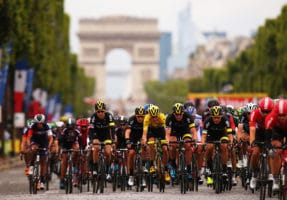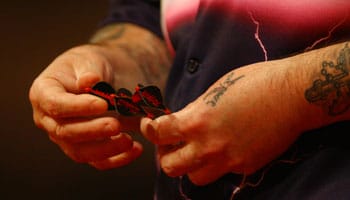For most cyclists and fans alike, Tour de France is the highlight of the year and the biggest cycling event in the world. In 2020, the Tour will be the first of the Grand Tours with Giro d’Italia and Vuelta a España following later in the year. The Tour may be the most prominent of the grand tours, but it’s also known as being the cruelest of the three. It’s not rare to see some of the world’s top riders giving up halfway or even taking it easy in the back at the start of the race.
To get through the long, flat, and hilly stages, even the best riders need to rely on their teammates before they take on the mountain stages on their own. This technique of keeping up but also resting is called ‘’drafting’’ and is what helps them survive the three-week race across France.
When does the race start and how does it work?
The 107th edition of the 2020 Tour de France commences on the 20th of August and will conclude on the 20th of September in the Champs-Elysees in Paris as it has happened every year since 1975.
The 2020 Tour is already being called the ‘’Highest in History’’ as it features more climbs than ever before, and that is important since the climbs are where the race is won and lost. The 2020 edition will feature 21 stages in total over 3,470 km; that’ll be around 100 km further than in 2019. To put that in perspective, that’s roughly the distance from London to Tel Aviv.
The Grand Depart, the start point, is Nice in the south of France, and the race will cover 8 mountain stages, 1 time trial, 9 flat stages, and 3 hilly stages. Since the first tour in 1903, the race has been held annually all the while gaining prominence and popularity, while constantly gaining in length and becoming more difficult, as its reach began to extend around the globe.
Nowadays, the tour is a UCI (Union Cycliste Internationale) World Tour Event which means that the Tour de France teams that compete in the race are mostly UCI pro teams. While the route of the modern Tour de France changes each year, the format of the race stays the same with the eventual winner being the cyclist with the lowest cumulative time across 3 different types of stage categories.
These include the time trials (individual performances against the clock), flat stages (high speed sections across the French countrysid)e, and mountain stages across the Alps and the Pyrenees – arguably the hardest part of the Tour. A low-key competition will be between the overall race leader and the point leader, with the overall classification winner awarded the famous yellow jersey, or “maillot jaune”, while the leader in points claims the green jersey, known as “maillot vert”.
Why does the winner wear a yellow jersey?
Simply because the pages of L’Auto, the newspaper that came up with the idea of the tour and started the race, had yellow pages so the jersey’s particular color was their way of promoting their newspaper. But the yellow jersey is not the only jersey in the race. It may garner more attention as it’s awarded to the winner of the overall classification, there are other classifications, secondary competitions, or contests within the tour. The green jersey is awarded to the point leader also known as the best sprinter, the polka dot jersey designates the race’s finest climber, while the white jersey is given to the highest ranked cyclist in the overall competition who’s also under the age of 25.
Who are the top contenders in the Tour de France 2020?
Between 1975 and 1986, French riders won nine times, but a Frenchman hasn’t won the Tour de France since 1985. There is no official winner listed between 1999 and 2005 since all seven wins of Lance Armstrong were stripped due to a doping scandal. When it comes to top records in individual stage wins, Eddy Merckx from Belgium is the all-time stage winner with 34 followed by Mark Cavendish from the UK with 30 and Bernard Hinault with 28.
Are there any Tour de France cyclists to challenge the records in 2020?
Egan Bernal
The 2019’s Tour de France winner, Egan Bernal, became the first rider from Latin America to win the race but also the youngest to win (22 at the time) since 1909. Now co-leader of team Ineos, Bernal placed 3rd in the Dauphiné opening day, took the overall title in La Route d’Occitanie, and finished second in the recent tour de I’Ain showing that he’s ready to reclaim the yellow jersey.
Chris Froome
British superstar Chris Froome of Team Ineos missed last year’s race due to injuries but now he’ll be seeking his fifth Tour de France title. Having won in 2013, 2015, 2016 and 2017, Chris Froome came 3rd in 2018 but the TDF 2020 may mark his return to the top.
Primoz Roglic
Jumbo-Visma’s Roglič had an impressive 2019 finishing on the podium at last year’s Giro D’Italia, winning the Vuelta a España, but he skipped the 2019 Tour de France. Last time he competed, in 2018, the Slovenian showed he could compete with the best after coming in fourth; considering his impressive performances in the Tour de l’Ain and in Dauphiné, he may well be the one to stand proud on the podium.
Tom Dumoulin
Tom Dumoulin, now racing in Jumbo-Visma colours, came in second in 2018’s Tour de France, and has made his long-awaited return to racing at the Tour de l’Ain after missing most of 2019 due to injuries. With a Giro de Italia title to his name and a 2nd place finish in the Tour de France two seasons ago, can he challenge for the yellow jersey once more?
Nairo Quintana
The Colombian of Arkéa-Samsic shows an impressive cycling career having won the 2014 Giro d’Italia and the 2016 Vuelta a España, while also coming in second in the Tour de France of 2013 and 2015. Having started the season with a bang, winning the Tour de la Provence, the Tour du Var and the stage 7 summit finish at Paris-Nice, Quintana will look to improve from last year’s 8th finish.
Thibaut Pinot
Groupama-FDJ’s Pinot departed the 2019 Tour de France tour in tears due to injury, just two days from the finish while being close to overall victory. Now the Frenchman appears to be back in top form following his 2nd place finish in Dauphiné and will be looking a better placement in the podium than his 3rd place in 2014.
Julian Alaphilippe
Julian Alaphilippe of Deceuninck-Quick Step surprised everyone with the fifth-place finish in 2019’s Tour de France. So far in 2020, the 28-year old Frenchman has come in 2nd in Milan–San Remo and finished 3rd in the French National Road Race Championships and hopes to inspire the French cyclist fans once again in 2020.
Geraint Thomas
Geraint Thomas has an impressive track record having won three World Championships (2007, 2008, and 2012), and two Olympic gold medals (2008 and 2012). The British cyclist of team Ineos has also won the 2018 Tour de France, but he finished in second place in 2019. Can he reach the top once more in 2020?
Steven Kruijswijk
The 33-year-old Dutchman of Jumbo-Visma came in third place in 2019 Tour de France, and after finishing fourth at the Tour de l’Ain, he’ll now be looking for his second Grand Tour podium finish of his career.
Tadej Pogačar
The 21-year old Slovenian, Tadej Pogačar, has shown his ability to fight with the very best riders after his 3rd finish in the 2019 Vuelta a España. Having also won the young rider classification in the same race, the youngster of team UAE Team Emirates finished fourth at Dauphiné, and he may well be the dark horse to look out for in the 2020 Tour de France.
Could one of the above be the final outright winner of the demanding race? Is there someone more suitable the claim the yellow jersey in the overall classification? Browse our picks and make your choice with our great Tour de France odds. If you’re looking for even more Tour de France betting options, you’ll find all you need in our cycling betting page including the chance to choose individual stage winners or the final point leader. For more news and analysis in all things cycling, head to our dedicated cycling predictions page.
Don’t miss more thrilling cycling events coming up in 2020 with the 2020 UCI Road World Championships taking place from the 20th to the 27th of September, the second Grand Tour, Giro d’Italia 2020, taking place from the 3rd October to the 25th October, as well as the final Grand Tour of the year, Vuelta a España 2020, from the 20th October to the 8th November.
















